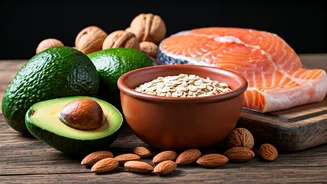Soluble Fiber's Role
Soluble fiber, a superstar in the realm of heart health, functions by binding with cholesterol in the digestive system. This binding action prevents the absorption
of cholesterol into the bloodstream. Foods such as oats, barley, apples, and beans are rich sources of soluble fiber. Regular consumption of these foods can contribute significantly to lowering LDL, the 'bad' cholesterol. Incorporating soluble fiber into your meals is fairly simple. Starting your day with a bowl of oatmeal, adding beans to your salads, or snacking on an apple are great ways to increase your intake. The fiber not only lowers cholesterol but also promotes gut health, resulting in an all-around positive effect on your body.
Unsaturated Fats Benefits
Unsaturated fats, known for their heart-healthy properties, come in two main forms: monounsaturated and polyunsaturated fats. These fats can help lower LDL cholesterol while increasing HDL, or 'good' cholesterol. Found in foods like olive oil, avocados, nuts, and seeds, these fats should replace saturated and trans fats in your diet. To benefit from these fats, choose olive oil for cooking, add avocado slices to your sandwiches, or snack on a handful of nuts. By selecting unsaturated fats over less healthy options, you're making a conscious choice that benefits your cholesterol levels and supports overall cardiovascular health. It's important to remember that, while beneficial, these fats should still be consumed in moderation.
Omega-3 Fats Explained
Omega-3 fatty acids, particularly EPA and DHA, are renowned for their positive effects on heart health. These essential fats can lower triglycerides, which are another type of fat in your blood, and also reduce the risk of heart disease. Excellent sources of omega-3s include fatty fish like salmon, mackerel, and sardines. Additionally, you can find them in flaxseeds and walnuts. Including omega-3 rich foods in your diet, at least twice a week, can be an easy strategy for enhancing heart health. If you are not a fan of fish, consider fish oil supplements, after consulting with a healthcare professional, as an alternative to ensure you're getting enough of these beneficial fats. Their anti-inflammatory properties add to their benefits, promoting overall well-being.
Plant Sterols' Power
Plant sterols, naturally occurring substances in plants, are structurally similar to cholesterol. When consumed, they compete with cholesterol for absorption in the gut. This results in less cholesterol being absorbed into the bloodstream. You can find plant sterols in foods such as fortified orange juice, yogurt, and certain spreads. Some foods are specially fortified to boost their plant sterol content. These fortified foods, when consumed as part of a balanced diet, can contribute to lower LDL cholesterol levels. For optimal results, aim to consume at least 2 grams of plant sterols per day. It’s always best to include a variety of these foods in your daily meals to maximize their cholesterol-lowering potential. Consider plant sterols as an effective, natural tool in your cholesterol-management strategy.















